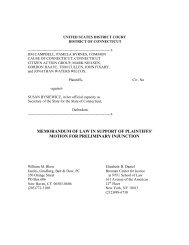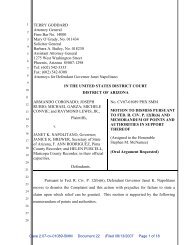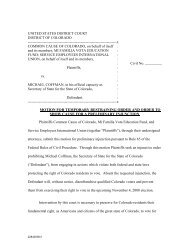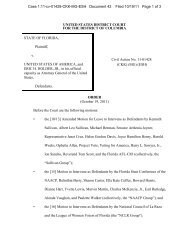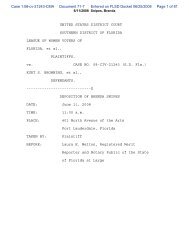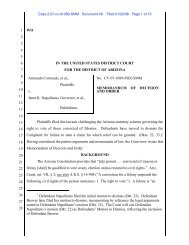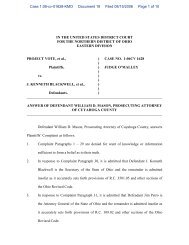its newly established Voting System Testing and Certification Program. 16 Pursuant to the Quality MonitoringProgram established in the Voting System Testing and Certification Program Manual (the “VSTCPM”) theEAC will post on its website “test reports” <strong>for</strong> all systems tested <strong>for</strong> EAC certification, regardless of whether ornot they are ultimately certified. These test reports will include a list of “discrepancies” identified during thetesting. 17 It will also post in<strong>for</strong>mation related to site audits that it conducts on manufacturers who participatein its program. 18Under the VSTCPM, vendors must report to the EAC “malfunctions” of EAC certified systems. TheVSTCPM defines “malfunction” as “a failure of a voting system, not caused solely by operator oradministrative error, which causes the system to cease operation during a Federal election or otherwiseresults in data loss.” 19 The EAC will also post this in<strong>for</strong>mation on its website. The EAC recentlyin<strong>for</strong>med the Brennan Center that it intends to post a map showing all jurisdictions that use EACcertified systems, with links to all vendor reported anomalies <strong>for</strong> such systems. 20 Finally, of relevanceto this report, election officials may voluntarily report “anomalies” <strong>for</strong> such systems if they result “insome disruption to the election process,” provided the election officials provide their name, title, andjurisdiction, among other in<strong>for</strong>mation. 21This new system had two recent important public successes. The first occured on June 25, 2010, whenthe EAC put out a “Voting System Technical Advisory” (VSTA) <strong>for</strong> the ES&S Unity 3.2.0.0 system,which has been certified by the EAC. The advisory came two months after Jane Platten, Director ofthe Cuyahoga County Board of Elections, notified the EAC that during testing of the machines priorto a May primary election, approximately 10 percent of the machines started powering down and thenfreezing. 22 After extensive consultation with both ES&S and Cuyahoga County, the VSTA was sentto election officials using the same system, advising them what steps to take in the event this freeze orpower failure occurred during opening or closing of the polls, or during voting. 23On August 23, 2010, the EAC issued a VSTA <strong>for</strong> the MicroVote EMS 4.0B, noting that the votingpanel <strong>for</strong> the system’s Direct Recording Electronic device would not operate with certain flash cards. 24While the recent steps by the EAC are unquestionably valuable, there are a number of factors which limit theusefulness of this reporting system. They are discussed in greater detail in Section IV (A Better Way to Trackand Address Voting System Problems) of this report. A summary of some of the most serious limitations of thecurrent system follows:• Perhaps most importantly, the EAC only certified its first voting system in February 2009 – meaningthat almost none of the machines currently in use in the United States are covered by VSTCPMreporting rules, or any federal reporting requirements, <strong>for</strong> that matter. Of the approximately 4,600election jurisdictions in the United States, we are aware of only a few dozen 25 that will use EAC certifiedequipment in 2010. In other words, approximately 99 percent of U.S. jurisdictions in 2010 will beusing equipment that is not certified by the EAC and there<strong>for</strong>e not covered by this program.• As most polling place equipment in use in the United States was purchased after 2002, and becausemany jurisdictions replacing equipment are likely to continue to use non-EAC certified equipmentin the future, we expect it could be decades be<strong>for</strong>e even a large majority of jurisdictions in the UnitedStates are using EAC certified systems. 26 In fact, only twelve states require federal certification <strong>for</strong>new systems, so – absent changes at the state level – it is not certain that the EAC’s programwill ever cover most jurisdictions in the United States. 278 | Brennan Center <strong>for</strong> Justice
• Mandatory reporting by vendors is required only if the EAC-certified system “malfunctioned”during a federal election. Thus, if a vendor becomes aware of a problem that occurred whenthere were no federal candidates on the ballot, it is apparently under no obligation to reportthe problem to the EAC.• Reporting under this system is limited to vendors and election officials <strong>for</strong> a very specific type ofproblem. For instance, it is not clear that manufacturers would have to report potential flaws theydiscover be<strong>for</strong>e they result in actual loss of votes on Election Day, or “merely” because they causedelay and long lines rather than a loss of data.• Independent investigators and voters with credible reports, no matter how numerous or serious,are not entitled to report problems.• Even where county election officials voluntarily provide anomaly reports (exposing themselvesto potentially unhappy vendors, as discussed on pages 25 - 26), the EAC is not requiredto provide this in<strong>for</strong>mation to other users of such systems unless various criteria are met,including verification from “the relevant State’s chief election official.” 28• Some election officials have complained that neither the EAC nor the vendors are required tonotify election officials immediately upon learning of a malfunction. Douglas A. Kellner, co-chairof the New York State Board of Elections, in a letter to the EAC praising them <strong>for</strong> issuing theirfirst Voting System Technical Advisory last June, noted that it came two months after the EACwas first notified of the problem and urged “the EAC to put in place a system that would allow animmediate preliminary notice to be distributed to all jurisdictions using the equipment involvedas soon as EAC staff has been able to verify a report.” 29For these and other reasons, most state and local election officials we interviewed tell us that they must still relyalmost exclusively on the voting system vendors <strong>for</strong> in<strong>for</strong>mation about malfunctions, defects, vulnerabilitiesand other problems that the vendors have discovered, or that have occurred with their voting systems in otherstates. Vendors are frequently under no legal obligation to provide such in<strong>for</strong>mation. While purchase orservice contracts sometimes bind election officials to in<strong>for</strong>m vendors of malfunctions, vendors are not alwayssimilarly obligated to in<strong>for</strong>m officials of problems reported to them. 30 As Jane Platten put it, “One of themore frustrating aspects of encountering problems [with voting systems], often while preparing and testing<strong>for</strong> elections as well as on election day or during tabulation, is that the vendors themselves often know aboutthe problems and never disclose any details whatsoever prior to the moment of crisis.” 31Of course, vendors do frequently notify election officials of problems when they occur, and often providesoftware patches or other procedural safeguards to ensure that such problems do not occur in the future.Un<strong>for</strong>tunately, in at least some instances, vendors have appeared slow to acknowledge such problems. 32More to the point, there is no centralized location where election officials can find in<strong>for</strong>mation about anomalies,malfunctions, usability concerns, 33 and other problems discovered with systems they are currently usingbe<strong>for</strong>e each election. A change in election administrators can sometimes mean a loss of knowledge about allof the potential problems with a voting system as well as procedural safeguards necessary to prevent thoseproblems. 34The result, as this report demonstrates, is that all too frequently the same failures in the same votingsystems occur in one jurisdiction or another, election after election. Often, these malfunctions – andtheir consequence, disenfranchisement – would have been avoided had election officials and/or publicadvocates known about previously encountered problems and had an opportunity to fix them.Brennan Center <strong>for</strong> Justice | 9
- Page 5: IV.A BETTER WAY TO TRACK AND ADDRES
- Page 11: 4. Pressure Vendors to Voluntarily
- Page 16 and 17: iii.failures of the current system:
- Page 18 and 19: 2. Humboldt County, California, Nov
- Page 20 and 21: 4. Pulaski County, Arkansas, May 20
- Page 22 and 23: 7. Florida, June 2004According to t
- Page 24 and 25: Denise Lamb, who currently serves a
- Page 26 and 27: Ms. Poucher has stated that it “w
- Page 28 and 29: Sequoia identified four possible ca
- Page 30 and 31: Had advocates and researchers in Ne
- Page 32 and 33: elative to voting system vendors. A
- Page 34 and 35: or potential vulnerabilities by any
- Page 36 and 37: Finally, the Department of Justice
- Page 38 and 39: Provide Timely & Organized Access t
- Page 40 and 41: the CPSC may compel the manufacture
- Page 42 and 43: Civil Division of the Department of
- Page 44 and 45: C. Analogous RegimesCivil penalty p
- Page 46 and 47: Of course, adding these kinds of pr
- Page 49 and 50: v. conclusionVoting is the most imp
- Page 51 and 52: System Vulnerabilities: should incl
- Page 53 and 54: February2008September2004November20
- Page 55 and 56: November2006November2006ES&SiVotron
- Page 57 and 58: June 2008SequoiaOptech 400CCaliforn
- Page 59 and 60: March 2004March 2004DieboldAccuVote
- Page 61 and 62: February2008September2008PremierAcc
- Page 63 and 64: event of an overvote displayed a co
- Page 67 and 68:
January 2008January 2008PremierAccu
- Page 69 and 70:
November2004ES&SM650FloridaSupervis
- Page 71 and 72:
October 2008February2008PremierAccu
- Page 73 and 74:
February2008February2008October 200
- Page 75 and 76:
2004 AccuVote 2000ESNovember2008Nov
- Page 77 and 78:
November2008November2008Hart InterC
- Page 79 and 80:
February2008May 2006August 2004May2
- Page 81 and 82:
March 2008June 2009November2008Prem
- Page 83 and 84:
February2008November2006SequoiaAVC
- Page 85 and 86:
November2008SequoiaImageCastNew Yor
- Page 87 and 88:
November2004November2004UnilectPatr
- Page 89 and 90:
November2008November2008March 2008E
- Page 91 and 92:
May 2008April 2008November2006May 2
- Page 93 and 94:
2006 iVotronicThe Post & Courier re
- Page 95 and 96:
AccuVote TSR6; HartInterCiviceScan;
- Page 97 and 98:
November2006ES&S:iVotronicTexasHida
- Page 99 and 100:
November2003November2009November200
- Page 101 and 102:
October 2008October 2008May 2008ES&
- Page 103 and 104:
appendix c : dupage county election
- Page 105 and 106:
and resolve problems with certified
- Page 107 and 108:
49. E-mail from Carolyn Crnich, Cle
- Page 109 and 110:
95. Kleinberg, supra note 92.96. Ma
- Page 111 and 112:
143. Telephone Interview with Rokey
- Page 113 and 114:
187. Id. at 22.188. See Thomas, sup
- Page 115 and 116:
1801 (“[T]he Secretary shall init
- Page 117 and 118:
258. See United States Department o
- Page 119 and 120:
294. John Archibald & Brett J. Blac
- Page 121 and 122:
334. Jane Musgrave, Palm Beach Coun
- Page 123 and 124:
374. Glitch Keeps Fulton Voters Wai
- Page 125 and 126:
417. Joe Dejka & Chris Olson, A Lat
- Page 127 and 128:
457. Letter from Dave Byrd, Preside
- Page 129:
498. Lauren Glendenning, Voting Gli
- Page 132:
ennancenterfor justiceAt New York U




![Download the Letter [PDF] - Brennan Center for Justice](https://img.yumpu.com/50139248/1/190x245/download-the-letter-pdf-brennan-center-for-justice.jpg?quality=85)

